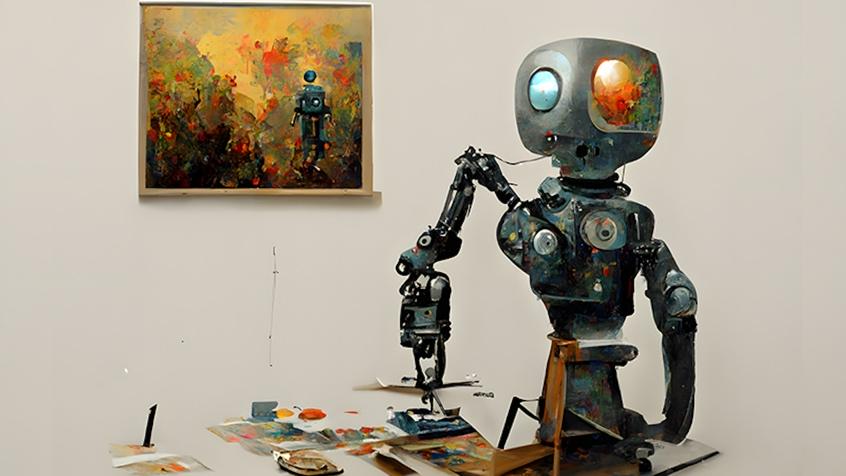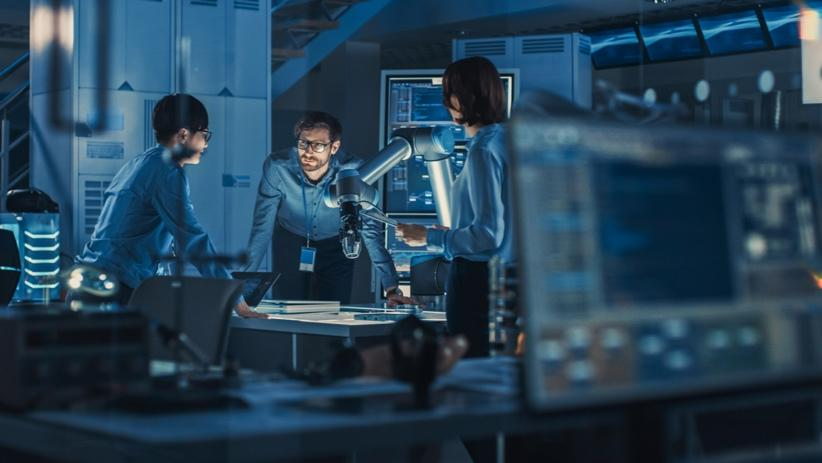- Overview
- Products
- Industries
- Services
Empowering You Through Digital Transformation
We share news, insights, analysis and research – tailored to your unique interests – to help you deepen your knowledge and impact.
AI have one principle that rules: think simple. But what we’re doing here with artificial intelligence, however, isn’t simple at all.
Artificial intelligence is shaping the future of humanity across nearly every industry. It is already the main driver of emerging technologies like big data, robotics and IoT, and it will continue to act as a technological innovator for the foreseeable future. One of the reasons for the current fight between ChatGPT vs BARD.
 Can AI Make Art More Human?
Can AI Make Art More Human?
The evolution of AI, Tesla founder and tech titan Elon Musk donated $10 million to fund ongoing research at the non-profit research company OpenAI — a mere drop in the proverbial bucket if his $1 billion co-pledge in 2015 is any indication.
After several decades marked by sporadic dormancy during an evolutionary period that began with “knowledge engineering,” technology progressed to model- and algorithm-based machine learning and increasingly focused on perception, reasoning and generalization. Now AI has re-taken center stage like never before — and it won’t cede the spotlight anytime soon.
AI is important because it forms the very foundation of computer learning. Through AI, computers have the ability to harness massive amounts of data and use their learned intelligence to make optimal decisions and discoveries in fractions of the time that it would take humans.
There’s virtually no major industry modern AI — more specifically, “narrow AI,” which performs objective functions using data-trained models and often falls into the categories of deep learning or machine learning — hasn’t already affected.
Transportation: Although it could take some time to perfect them, autonomous cars will one day ferry us from place to place.
Manufacturing: AI powered robots work alongside humans to perform a limited range of tasks like assembly and stacking, and predictive analysis sensors keep equipment running smoothly.
Healthcare: In the comparatively AI-nascent field of healthcare, diseases are more quickly and accurately diagnosed, drug discovery is sped up and streamlined, virtual nursing assistants monitor patients and big data analysis helps to create a more personalized patient experience.
Education: Textbooks are digitized with the help of AI, early-stage virtual tutors assist human instructors and facial analysis gauges the emotions of students to help determine who’s struggling or bored and better tailor the experience to their individual needs.
Media: Journalism is harnessing AI, too, and will continue to benefit from it. Bloomberg uses Cyborg technology to help make quick sense of complex financial reports. The Associated Press employs the natural language abilities of Automated Insights to produce 3,700 earning reports stories per year — nearly four times more than in the recent past.

Customer Service: Last but hardly least, Google is working on an AI assistant that can place human-like calls to make appointments at, say, your neighborhood hair salon. In addition to words, the system understands context and nuance.
But those advances — and numerous others — are only the beginning. There’s much more to come.
With companies spending billions of dollars on AI products and services annually, tech giants like Google, Apple, Microsoft and Amazon spending billions to create those products and services, universities making AI a more prominent part of their curricula, and the U.S. Department of Defense upping its AI game, big things are bound to happen. Some of those developments are well on their way to being fully realized; some are merely theoretical and might remain so. All are disruptive, for better and potentially worse, and there’s no downturn in sight.
Risks of AI on SocietyThe bottom 90 percent, especially the bottom 50 percent of the world in terms of income or education, will be badly hurt with job displacement, because AI can, within the routine task, learn to optimize itself. In the matter of five, 10 or 15 years, they will be displaced by AI.” In the warehouses of online giant and AI powerhouse Amazon, which buzz with more than 100,000 robots, picking and packing functions are still performed by humans — but that will change.
AI in the near futureOn a far grander scale, AI is poised to have a major effect on sustainability, climate change and environmental issues. Ideally and partly through the use of sophisticated sensors, cities will become less congested, less polluted and generally more livable.
Will AI take over the world?AI is projected to have a lasting impact on just about every industry imaginable — as 60 percent of businesses are predicted to be affected by it. We’re already seeing artificial intelligence in our smart devices, cars, healthcare system and favorite apps, and we’ll continue to see its influence permeate deeper into many other industries for the foreseeable future.
AI and privacy risksIn a 2018 paper published by UK-based human rights and privacy groups Article 19 and Privacy International, anxiety about AI is reserved for its everyday functions rather than a cataclysmic shift like the advent of robot overlords.
“If implemented responsibly, AI can benefit society,” the authors wrote. “However, as is the case with most emerging technology, there is a real risk that commercial and state use has a detrimental impact on human rights.” The authors concede that the collection of large amounts of data can be used for trying to predict future behavior in benign ways, like spam filters and recommendation engines. But there’s also real threat that it will negatively impact personal privacy and the right to freedom from discrimination.
 Preparing for the Future of AI – The possibilities of Artificial
General Intelligence
Preparing for the Future of AI – The possibilities of Artificial
General Intelligence
Speaking at London’s Westminster Abbey in late 2018, internationally renowned AI expert Stuart Russell joked (or not) about his “formal agreement with journalists that I won’t talk to them unless they agree not to put a Terminator robot in the article.” His quip revealed an obvious contempt for Hollywood representations of far-future AI, which tend toward the overwrought and apocalyptic. What Russell referred to as “human-level AI,” also known as artificial general intelligence, has long been fodder for fantasy. But the chances of its being realized anytime soon, or at all, are pretty slim.
This offers us a lot to think about. On the subject of which, emulating the human brain is exceedingly difficult and yet another reason for AGI’s still-hypothetical future.
“Most AGI researchers expect AGI within decades, and if we just bumble into this unprepared, it will probably be the biggest mistake in human history. It could enable brutal global dictatorship with unprecedented inequality, surveillance, suffering and maybe even human extinction,” Tegmark said in his TED Talk. “But if we steer carefully, we could end up in a fantastic future where everybody’s better off — the poor are richer, the rich are richer, everybody’s healthy and free to live out their dreams.”
Source: Mike Thomas, Published on Builtin